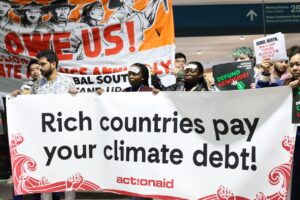
With the imminent COP28 talks in Dubai on the horizon, a proposal from an advisory panel is set to redefine climate financing.
The panel advocates for pivotal measures aimed at mobilizing trillions of dollars to combat climate change, primarily through an increase in taxes on polluting activities and a substantial reduction in fossil fuel subsidies.
Amar Bhattacharya, a key panel member from the Brookings’ Center for Sustainable Development, stressed the global potential of taxing detrimental activities, particularly emissions from the maritime and aviation sectors.
This “taxing the bad” approach seeks to discourage activities harmful to the public good, such as greenhouse gas emissions, while simultaneously generating substantial revenue for climate initiatives.
The panel’s report underscores the urgency of diversifying funding sources, highlighting the stark contrast between investments in the fossil fuel economy and those in the clean economy. It reveals staggering subsidies for fossil fuels, totalling $1.3 trillion, with additional costs associated with managing emissions and pollution.
Vera Songwe, co-chair of the report and former World Bank member, emphasized the crucial focus on advancing investments to meet the Paris Agreement targets for limiting global warming below 2 degrees Celsius.
Stressing the cost implications of delays, she warned that postponing action would result in even more substantial expenses.
Amid climate financing discussions, the report acknowledges the political challenges of taxing record profits from oil and gas companies following the Ukraine war.
Nevertheless, it emphasizes the moral obligation for energy companies to make voluntary contributions, a point that will be underscored at COP28 and beyond.
The panel also sheds light on the imperative need for financial support for emerging and developing economies, estimating a staggering $2.4 trillion annual investment requirement by 2030 to facilitate the energy transition and climate change adaptation.
Furthermore, it calls on wealthy nations to fulfil their commitment of $100 billion to assist poorer countries with climate change, advocating for a tripling of concessional loans by 2030.
These recommendations form a crucial part of the broader discourse at COP28, addressing climate financing challenges and reshaping the global narrative on energy transition, adaptation finance, and multilateral development bank reform.






